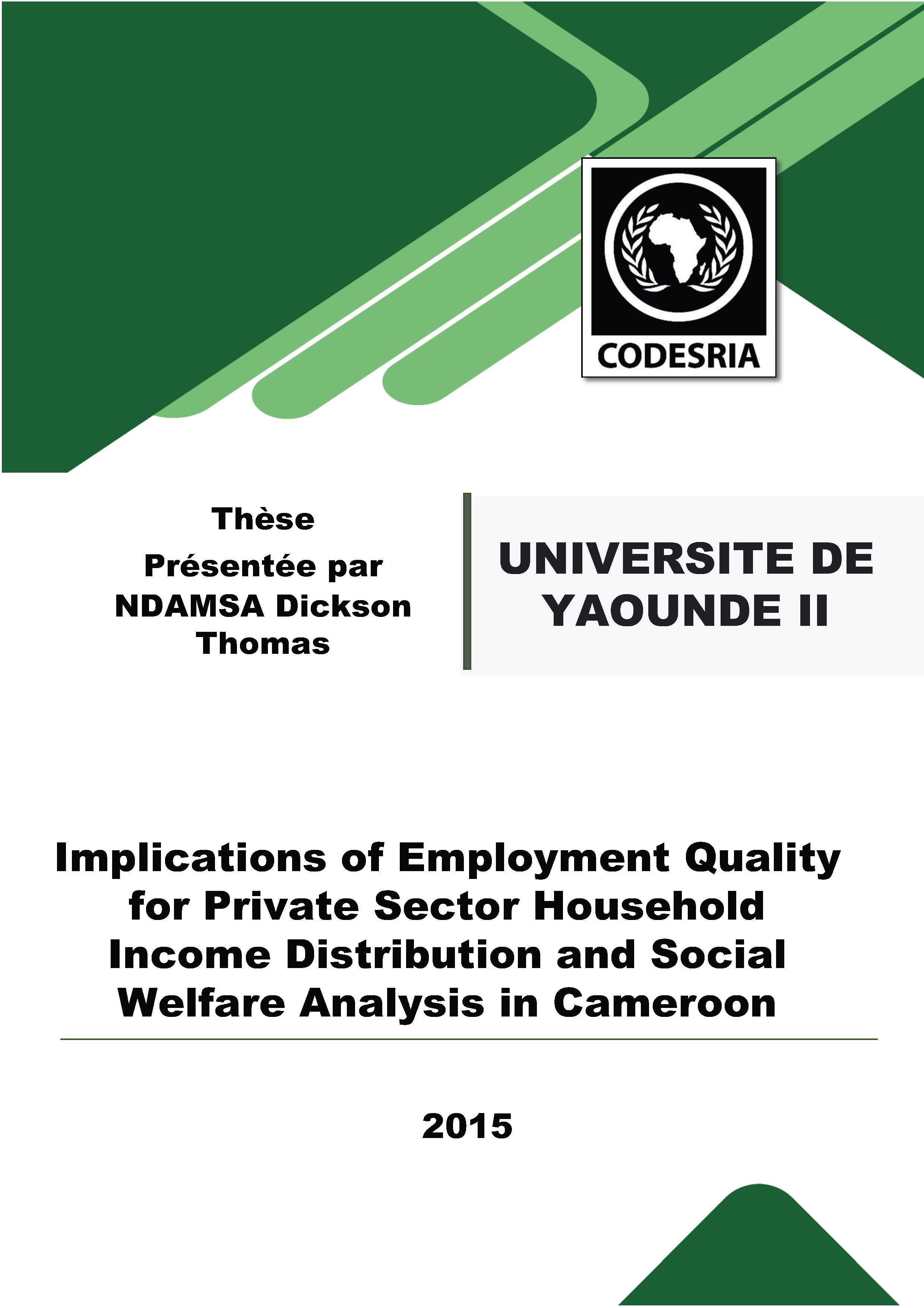Implications of Employment Quality for Private Sector Household Income Distribution and Social Welfare Analysis in Cameroon
Keywords:
Employment, Quality, Private Sector, CameroonSynopsis
This thesis assesses the implications of employment quality (vulnerability and decency) for Private sector household income distribution andsocial welfare, while controlling for other income components, using the 2007 Cameroon household consumption survey. Specifically, this thesis develops a conceptual framework that reconciles the alJove concepts; constrocts
and studies the distribution of employment quality indicators; determines the effect of employment vulnerability on private sector income, while verijj,ing the theory of compensating wage differentials; studies the determinants of private sector income
inequality; assesses the social welfare shares and impacts of regressed4ncome sources and sectors of employment. To address these objectives, use is made of mult_iple correspondence and stochastic dominance analyses, controlfimction econometric analyses, regression-based andgeneralised social welfare decompositions. In terms of employment vulnerability, results show a net dominance of the private sector over thepublic sector; Within the private sector, informal sector employment clearly dominates format sector employment, .and farm employment dominates non-farm employment. Econometric results show that employment vulnerability generally correlates inversely with private sector income. Results indicate evidence of compensation for managerial and supervisory duties in the private sector. Employment vulnerability registers the largest diluting effect on private sector income and is inequality increasing. The within-sector component overwhelmingly accounts for observed private sector income inequality .and the bulk of this within component of income inequality is captured in the infcmnal and farm sectors of employment. Education human capital and decent employment endowments are prominent in determining overall private sector social welfare, and growth in decent employment that is distributedprowrtionately to all private sector workers, increases social welfare considerably while reducing overall private sector inequality. These finding$ have implications for creating an enabling environment that promotes employment qualrty among private sector workers in Cameroon. In this regard, to eradicate employment vulnerability while improving access to education, public policy may also target a delivery system that meets labour market requirements.
Downloads
References
Fields, G. S. (2004). "Regression-Based Decompositions: A New Tool for Managerial Decision-Making", Department of Labour Economics, Cornell University, New York.
Fields, G. S. (2007). "Modeling labor market policy in developing countries: A selective review of the literature and needs for the future", IPC Working Paper Series Number 32, Ann Arbor, MI: International Policy Center.
Fields, G. S. and Yoo, G. (2000). "Falling labour inequality in Korea's Economic Growth: Patterns and underlying causes", Review of Income and Wealth, 46 (2), p.139-59.
Foko, B., Ndem, F. and Tchakote, R. (2007). "Pauvrete et Inegalites des conditions de vie au, Cameroun : une approche micro multidimensionnelle », Poverty and Economic Policy Research Network, cahier de recherche PMMA, available at www.pep-net.org
Fomba, B. K. (2008). Contrat de Travail et Fonctionnement du Marche du Travail au Cameroun, These de doctorat d~Etat en Sciences Economiques non publiee, Universite de Yaounde II, Soa.
Fomba, B. K. (2011). "Labour Contracts and Performance of Cameroonian Firms", IZA Discussion paper 6211, December 2011.
Foster, J. E. (1996). On Economic Inequality, Oxford University Press, New York.
Foster, J. E. and Ok, E. A. (1999). "Lorenz Dominance and the Variance of Logarithms", Econometrica, 67( 4), p.901-907.
French, M. T. and Dunlap, L. J. (1998). ''Compensating wage differentials for job stress," Applied Economics, 30, p.1067-1075.
Garen, J. (1984). "The Returns to Schooling: A Selectivity Bias Approach with a Continuous Choice Variable," Econometrica, 52(5), p.1199-1218.
Gariety, B. S. and Shaffer, S. (2001). "Wage differentials associated with flextime", Monthly Labour Review, 124, p.68-75.






